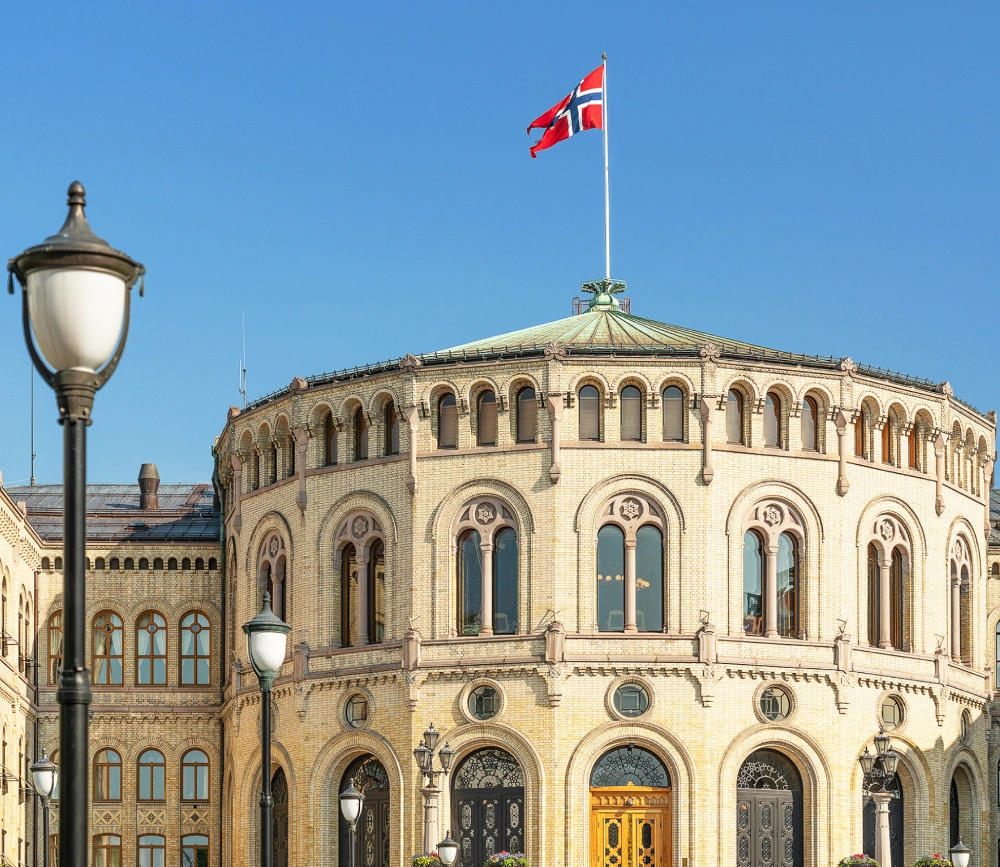Study in
Norway
Study in
Norway
Study in Norway: A Gateway to Quality Education in Northern Europe
Norway, located in Northern Europe, is a member of the EEA- the European Economic Area and the European Free Trade Association (EFTA).
Though not an EU member, Norway maintains strong ties with European nations. It shares borders with Sweden, Finland, and Russia. Known for its breathtaking fjords, advanced economy, and progressive society, Norway stands out as a safe and serene destination for international students.
A high-income country with a robust welfare system, Norway has an economy heavily reliant on natural resources, including oil, gas, hydropower, and fisheries.
Its growing technology and innovation sectors create job opportunities for skilled workers, including international graduates. Labour shortages exist in healthcare, IT, education, and engineering, making it easier for qualified international students to find jobs after graduation.
Why Study in Norway?
Norway offers world-class higher education in an environment that values openness, equality, and academic freedom. The country boasts some of the world's best universities, featuring modern campuses, cutting-edge research, and a high standard of living.
One of the most attractive features for international students is that public universities in Norway do not charge tuition fees, regardless of whether students are from within or outside the European Union (EU) or the European Economic Area (EEA). This reflects the government's
strong commitment to education as a public good.
Study in Norway for Indian Students
Indian students looking to study abroad in Europe are increasingly choosing Norway due to its high-quality education, tuition-free policy, and stringent safety standards. Whether you wish to study undergraduate, postgraduate, or doctoral programs, Norwegian institutions offer courses in English that cater to international students.
Indian students are particularly welcome at both public and private universities in Norway. These institutions provide pre-arrival guidance, student orientation, language support, and housing services. Students can work while studying part-time and may be eligible to apply for a post-study work permit after graduation.
Study Abroad in Norway: Education System
Norway's post-secondary education is divided into universities, university colleges, and private institutions. They maintain high academic standards and offer degree programs in various subjects, including the natural sciences, engineering, social sciences, arts, and health sciences.
The Bologna Process governs higher education in Norway, ensuring compatibility with the European Credit Transfer and Accumulation System (ECTS). This makes degrees from Norwegian institutions internationally recognised and facilitates credit transfer.
Study in Norway for International Students' Requirements
To apply for a study program in Norway, international students need:
- A recognised secondary school certificate or bachelor's degree
- Proof of English proficiency (TOEFL/IELTS or equivalent)
- A statement of purpose and recommendation letters
- Financial documents to prove funds for living expenses
- Valid passport and other identity documents
Students must also apply for a residence permit for their studies.
Study in Norway Master's Programs
Master's degree programs in Norway span two years and include both coursework and independent research. Many master's programs are taught in English and attract students from all over the world. Popular fields include:
- Computer Science
- Engineering
- Business Administration
- Environmental Sciences
- Education
- Health Sciences

Study Nursing in Norway for International Students
Nursing is a respected and in-demand profession in Norway. International students can pursue bachelor's and master's degrees in nursing, some of which are offered in English.
Study Nursing in Norway in English
Several universities offer English-taught nursing programs. However, for clinical practice and job placement, learning Norwegian becomes essential. Some institutions provide language training to help students integrate into the healthcare system.
Study Computer Science in Norway in English
Computer science is a growing field in Norway, with programs offered in English at both bachelor's and master's levels. These courses cover artificial intelligence, cybersecurity, data science, and software engineering.
Graduates can apply for jobs in Norway's expanding IT sector, which offers competitive salaries and career growth.

Can I Study in Norway Without IELTS?
Yes, students from English-speaking countries or those who have completed previous education in English may be exempt from providing IELTS or TOEFL scores. Each institution has its language requirements, so it's best to check with the university directly.
How Much Does It Cost to Study in Norway?
While tuition is free at public universities, students are still responsible for covering their living expenses. The estimated monthly cost of living is NOK 12,000 (approx. INR 1,00,000). This includes accommodation, food, transportation, and other personal expenses.
Students are also required to show proof of sufficient funds (currently around NOK 1,28,000 per year) when applying for a student visa.
Norway Study Abroad Agency in India
KCR CONSULTANTS, a trusted study abroad consultancy in India, provides complete guidance to Indian students planning to study in Norway. From course selection and university applications to visa documentation and pre-departure support, we ensure a smooth transition.
Study in Norway Consultants
Partnering with experienced study consultants in Norway, such as KCR CONSULTANTS, helps students make informed decisions. Our consultants are well-versed in Norwegian education, visa rules, and post-study work opportunities.
How to Get PR in Norway After Studying
After completing your studies in Norway, you can apply for a job-seeker visa, which allows you to stay for up to one year to find employment. Once you secure a skilled job, you may apply for a work permit. After living and working in Norway for three years on a valid work permit, you may be eligible to apply for permanent residency.
Student Visa for International Students
To study in Norway, non-EU/EEA students must apply for a student residence permit. This allows you to stay for the duration of your studies and work part-time (up to 20 hours per
week).
Applying for a Student Visa in Norway:
1. Receive an admission letter from a recognised institution.
2. Prepare the required documents:
Passport copy
- Passport copy
- Admission letter
- Proof of funds
- Accommodation confirmation
- Health insurance
3.Submit the online application on the Norwegian Directorate of Immigration (UDI) website.
4.Book an appointment at the embassy/consulate of Norway in your city or country.
5.Attend the visa interview and provide biometrics.
Visa processing time can take up to two months, so apply well in advance.
How to Get PR in Norway After Studying
After completing your studies in Norway, you can apply for a job-seeker visa, which allows you to stay for up to one year to find employment. Once you secure a skilled job, you may apply for a work permit. After living and working in Norway for three years on a valid work permit, you may be eligible to apply for permanent residency.
Student Visa for International Students
To study in Norway, non-EU/EEA students must apply for a student residence permit. This allows you to stay for the duration of your studies and work part-time (up to 20 hours per
week).
Applying for a Student Visa in Norway:
1. Receive an admission letter from a recognised institution.
2. Prepare the required documents:
Passport copy
- Passport copy
- Admission letter
- Proof of funds
- Accommodation confirmation
- Health insurance
3.Submit the online application on the Norwegian Directorate of Immigration (UDI) website.
4.Book an appointment at the embassy/consulate of Norway in your city or country.
5.Attend the visa interview and provide biometrics.
Visa processing time can take up to two months, so apply well in advance.
Conclusion
Studying in Norway provides more than just a degree. It offers a transformative international experience in a safe, welcoming, and forward-thinking country. With no tuition fees at public universities, a wide range of English-taught programs, excellent student support services, and promising job prospects after graduation, Norway is fast becoming a preferred country for Indian and international students alike.
For expert assistance with applications, visas, and post-arrival guidance, reach out to KCR CONSULTANTS – your trusted partner in fulfilling your dream to study in Norway.
We are here to help you!
Open from 8am - 8pm Monday - SATURDAY
Fill out the form below to receive expert advice and guidance.

